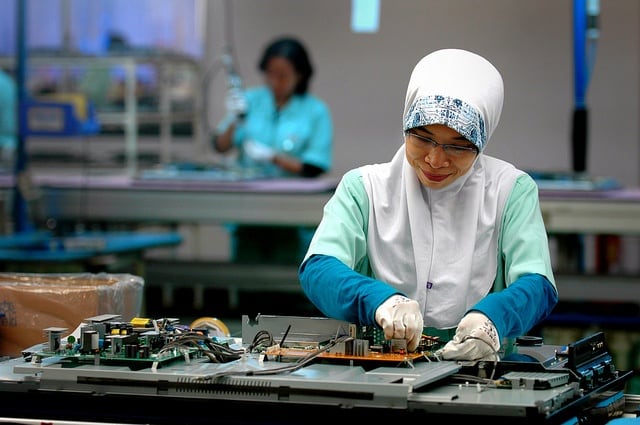Photo credit: ILO/Asrian Mirza
A quarter of the world’s manufacturing is for the electronics sector. It employs millions of workers. Reports of exploitation are rife, with The Atlantic reporting just last month that as many as 32% of workers in Malaysia’s electronics sector are in forced labor. 1 Further down the supply chain, campaigning has focused on ending slavery in the precious mineral mining sector supplying the electronics industry, such as Freedom United’s campaign calling on EU to set mandatory reporting on mineral sourcing.2
But solutions exist. The most effective is when workers are empowered and able to drive change in the workplace. Electronics Watch is about worker-driven monitoring rather than top-down transparency or inspections and audits.
Open Democracy explains:
Electronics Watch works with public sector institutions such as universities and local councils to include legally enforceable codes of conduct for electronic suppliers in their contracts. They then conduct independent investigations of factories, and use the results to raise issues with brands and suppliers, as well as to demand improvements in line with the contractual codes of conduct and national or international labour laws.
Workers are at the heart of this process. Workers’ are able to raise concerns about their workplace, either anonymously or via civil society worker organisations in their area. If the issues raised are substantiated and contravene the contracts suppliers signed, then Electronics Watch will conduct an investigation.
Investigations are undertaken by civil society organisations already established in the manufacturing locations. The interviews they conduct with workers are carried out in secure, off-site locations away from potentially threatening managers. Workers then remain involved as the investigators draw up their recommendations for change that will be put to purchasers and suppliers.
In addition to on-site investigations, working conditions in these factories benefit from workplace transparency for workers and by workers, not only for buyers. For example, Electronics Watch would like workers to have access to the social audit reports of other factories, so they can compare labour conditions and better understand their rights with regard to unionisation and collective bargaining.
Electronics Watch can take credit for improvements in a number of forced labor situations in factories in China, Thailand and the Philippines. However, their initiative is not always welcomed by companies and some authorities, particularly China, who have made it difficult for civil society organizations to operate.







Freedom United is interested in hearing from our community and welcomes relevant, informed comments, advice, and insights that advance the conversation around our campaigns and advocacy. We value inclusivity and respect within our community. To be approved, your comments should be civil.
Back in the early 90s we had 10 huge electronic factory’s here in Tampa Florida and now not one left but while we were not forced labor but poor working condition unpaid over time and simply just missing time claiming we took to long on brake or lunch and they got away with it is it was know if you fired or quit with notice when would result in your being fire you not have any luck being hired in the other 9 factory’s IE blacklisted. so we had similar problem with them